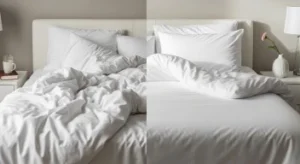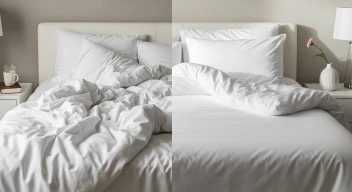Morning Bed-Making Habits
Do you make your bed every morning, or do you leave it in a cozy pile of blankets until later—if at all?
For such a small daily decision, the act of making (or skipping) your bed says a lot about your personality, mindset, and even your mental health.
Some people can’t start their day without smoothing out the sheets and lining up their pillows perfectly. Others feel that leaving the bed unmade is a harmless rebellion—a way of saving time or embracing comfort.
But here’s the thing: psychologists and behavioral experts say your morning bed-making habit might reveal deeper insights into how your brain works, how you deal with stress, and even how satisfied you are with life overall.
Let’s dive into what science really says about this surprisingly telling morning ritual—and why your bed might just be a mirror of your mind.
The Psychology Behind Bed-Making Habits
Morning Bed-Making Habits

Morning Bed-Making Habits
Our brains thrive on patterns. When you make your bed each morning, you’re essentially giving your mind a tiny win before the day even begins. It’s a visual cue that says, “I’ve accomplished something.”
This concept aligns with what U.S. Navy Admiral William H. McRaven famously said in his commencement speech:
“If you want to change the world, start by making your bed.”
It might sound simplistic, but he’s right. Starting your day with structure can trigger a ripple effect of accomplishment and discipline.
According to a Lake Granbury Medical Center article, people who make their bed regularly are more likely to report feeling organized, productive, and emotionally stable. On the flip side, those who skip it often lean toward spontaneity, creativity, or even mild resistance to authority—traits that can be strengths in their own right.
What Bed-Making Says About Your Personality Type
Let’s explore what research and psychology suggest your bed habits might reveal about you:
1. The Bed-Maker: Structured, Conscientious, and Calm
If you can’t stand a messy bed, you’re probably someone who thrives on order. You find peace in tidiness and take pride in the little things.
A 2017 study published in Personality and Individual Differences found that people who prefer tidy environments tend to score higher on conscientiousness—a personality trait associated with reliability, self-discipline, and attention to detail.
Read our guide on Morning Habits That Boost Your Energy All Day to build a routine that supports structure and motivation.
Making your bed also aligns with the psychology of completion—our brains love closure. Starting your day by finishing something triggers dopamine release, improving your mood and focus.
2. The Bed-Skipper: Creative, Independent, and Emotionally Flexible
If you skip making your bed, don’t feel guilty—you might just be wired differently.
Some psychologists suggest that “bed-skippers” value freedom, creativity, and time optimization over structure.
People who skip bed-making tend to rate higher on openness to experience, meaning they enjoy novelty, imagination, and self-expression. You might be someone who gets inspiration from organized chaos—a little mess fuels your flow.
This mindset can actually promote creative thinking. Studies show that messy environments can stimulate abstract thinking and innovation—great news for artists, writers, and problem-solvers.
3. The “Sometimes” Bed-Maker: Balanced and Adaptive
Then there’s the middle ground—the people who make their bed when they feel like it.
These individuals often strike a balance between structure and flexibility. They know when routine helps and when it doesn’t, adapting their habits based on how they feel.
This adaptability often reflects a high emotional intelligence, meaning you’re tuned into your needs and moods rather than locked into rigid behavior patterns.
Morning Habits and Mental Health: More Connected Than You Think
Your morning routine sets the tone for the entire day. Making your bed might seem minor, but it’s a foundational behavior that contributes to what psychologists call “behavioral activation.”
In simple terms, doing one small positive task early on encourages more productive actions to follow.
Why It Matters
When you start your day with intentionality—whether through making your bed, stretching, or drinking water—you’re sending a message to your brain: I’m in control.
This can be particularly helpful for managing anxiety or depression, where lack of motivation can make even small tasks feel overwhelming. Research in Clinical Psychology Review shows that people who develop structured morning routines experience reduced stress and improved focus throughout the day.
So yes, your bed habit matters. It’s part of a chain reaction that affects your mood, mental clarity, and motivation.
Does a Messy Bed Mean a Messy Mind? Not Necessarily
There’s a common saying that a messy space equals a messy mind—but that’s not always true.
Some studies suggest that a bit of disorder can actually boost creativity. A famous experiment from the University of Minnesota found that participants in messy rooms generated more innovative ideas than those in tidy ones.
That said, excessive mess can increase stress hormones like cortisol. The trick is to find your personal balance—enough structure to feel calm, but enough freedom to stay creative.
Check out our post on The Science of Love Hormones to understand how emotional balance affects daily motivation and self-discipline.
The Hygiene Debate: Should You Make Your Bed at All?
Here’s where things get interesting. While making your bed may feel virtuous, some scientists argue it’s not always hygienic.
According to research from Kingston University, tightly tucking your sheets in the morning traps moisture and warmth—conditions dust mites love. Leaving your bed unmade for a few hours, however, exposes the sheets to sunlight and air, making it harder for mites to survive.
That doesn’t mean you should stop making your bed altogether. Instead, experts suggest airing it out first—fold back the sheets for 20–30 minutes before making it neatly.
Resource: Kingston University research on dust mites and bed hygiene
So yes—science supports both sides depending on your perspective: organization versus sanitation.
How Bed-Making Reflects Broader Personality Traits
When psychologists analyze habits like bed-making, they often connect them to the Big Five Personality Model—a framework used to measure human behavior:
| Personality Trait | How It Appears in Bed-Making Habits |
| Conscientiousness | High in those who make their bed daily |
| Openness | High in those who prefer flexibility or skip it |
| Agreeableness | Often moderate—linked to cooperation and shared spaces |
| Neuroticism | May influence inconsistency in habits or stress around cleanliness |
| Extraversion | Doesn’t directly correlate, though organized people may appear more confident |
Your bed habit, in essence, is a small reflection of how you approach control, comfort, and self-expression.
Building a Morning Routine That Works for You
Morning Bed-Making Habits

Morning Bed-Making Habits
Instead of judging yourself for making or skipping your bed, focus on what feels best for your energy and mindset.
Here are a few ways to make mornings more intentional:
- Start with one small act of order. If not your bed, tidy your nightstand or set your clothes out for the day.
- Pair it with gratitude. As you smooth your sheets, think of one thing you’re thankful for—it combines structure with positivity.
- Incorporate light movement. Gentle stretching or breathing exercises right after waking can set your tone for calm focus.
- Let sunlight in. Opening your blinds while you make your bed boosts serotonin and helps regulate your circadian rhythm.
Resource: Harvard Health – How light affects your sleep and energy.
The Emotional Meaning of Making the Bed
At its core, making your bed isn’t about housekeeping—it’s about self-respect and care.
It’s a way of saying, “I value my space and my peace.”
People who create this simple daily ritual often describe a subtle but real sense of calm. It gives closure to the night and a fresh start to the day—psychological transitions that help you separate rest from action.
Even if you’re not naturally tidy, experimenting with bed-making for a week can show you just how much small acts of order influence your mindset.
Your Bed as a Mirror of Your Lifestyle
Think of your bed as a microcosm of your habits:
- If it’s consistently neat, you probably value predictability and comfort.
- When it’s a little messy, you may prioritize freedom and authenticity.
- If it changes daily, you might be adaptive and emotionally tuned in.
Neither is “better.” What matters is recognizing your pattern and ensuring it supports your mental wellness and daily flow.
Bringing It All Together
Whether you love tucking in every corner or can’t be bothered to fix your blankets, your morning bed-making habit tells a quiet story about who you are.
Science suggests that while tidy spaces can enhance focus and calm, messy ones can nurture creativity and individuality. There’s no single right approach—only what aligns best with your personality and lifestyle.
So tomorrow morning, before you rush out the door, pause for a second.
Look at your bed, and ask yourself—not, “Should I make it?” but rather, “What does this small choice say about how I want to feel today?”







